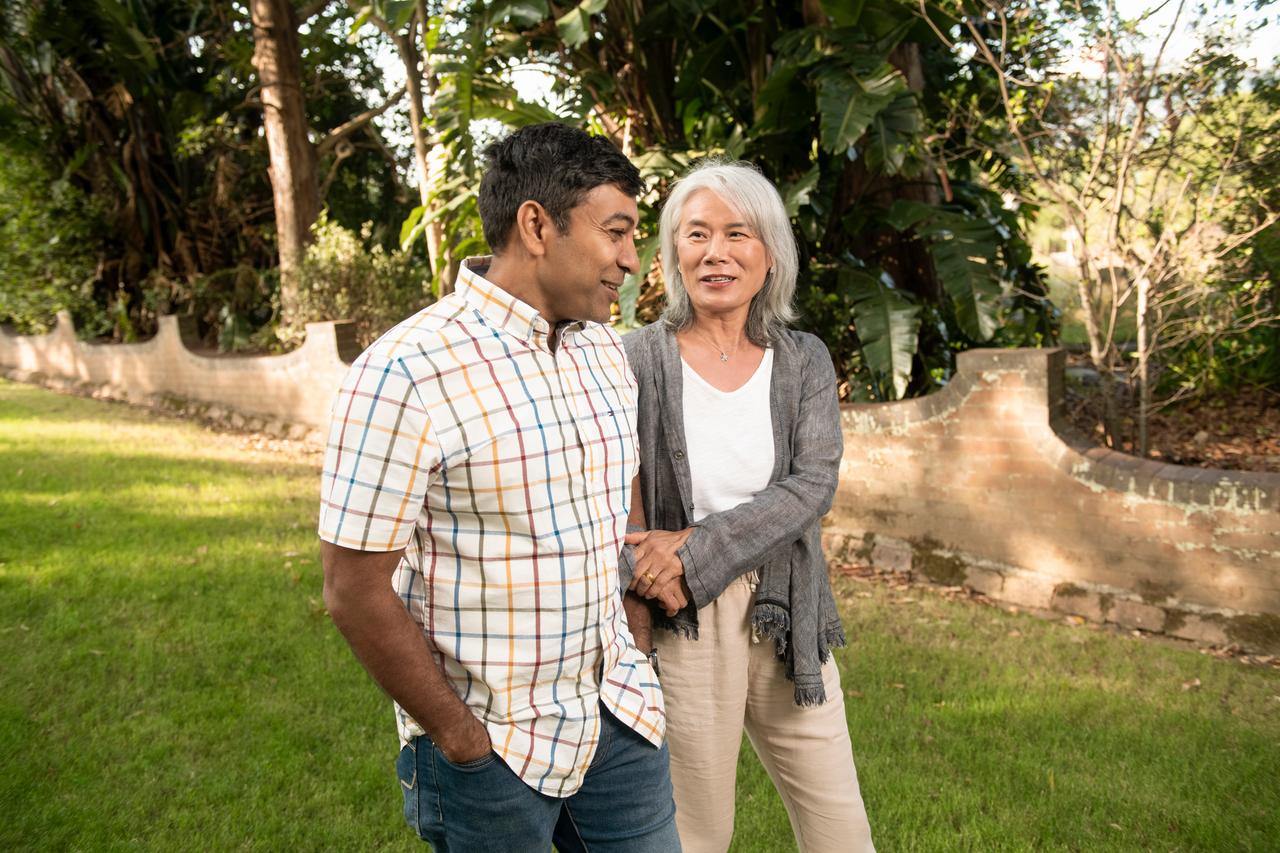- Patients
- Exploring cancer care
- Conditions we treat
- Blood cancer
- Non-Hodgkin lymphoma
What is non-Hodgkin lymphoma?
Chapter 01
What is non-Hodgkin lymphoma?
Non-Hodgkin lymphoma, previously known as non-Hodgkin disease, is a blood cancer that starts in the lymphatic system.1
The lymphatic system is part of the immune system and includes your lymph glands and organs such as the spleen. Its functions include:1
- Removal of cellular waste
- Carrying nutrients
- Production of immune cells to help fight infections
The lymphatic system contains white blood cells called lymphocytes. Non-Hodgkin lymphoma starts in these lymphocytes and causes abnormal lymphocytes, which typically reside in the lymph glands.1 The abnormal cells grow and multiply, leading to lymph node swelling.1
The lymph nodes are the most common part of the body to be affected.1But non-Hodgkin lymphoma can also involve the spleen and other extra-nodal sites such as the central nervous system, bone, and stomach.1Non-Hodgkin lymphoma can also cause systemic symptoms such as fevers, drenching night sweats, lethargy, and weight loss.1
Non-Hodgkin Lymphoma is different from Hodgkin lymphoma and is more common.1
Types of non-Hodgkin lymphoma
There are different types of non-Hodgkin lymphoma, depending on what type of lymphocyte is affected and how fast the tumour grows.1 These are three types of lymphocytes:1
- B-cells – These make antibodies that fight infection in the body
- T-cells – These help B-cells make antibodies and kill antigens that shouldn’t be in the body.
- Natural Killer (NK) cells – These specialise in killing cancer cells
The different types of non-Hodgkin lymphoma are:
- B-cell lymphomas – These make up around 85% of all non-Hodgkin lymphomas.1 A few of the different types of B-cell lymphomas can include:1
- Follicular lymphoma - The cancer cells usually grow slowly in lymph nodes in circular groups, at the microscopic level, and these are called follicles.
- Diffuse large B-cell lymphoma - Regarded as being a fast-growing cancer and is quite a common sub-type in adults
- Small lymphocytic lymphoma - This is a slow-growing cancer, and is often thought about being similar to chronic lymphocytic leukaemia
- Mantle cell lymphoma - It develops in the outer edge of affected lymph nodes, can look slow-growing but actually be fast-growing
Other types of B-cell lymphomas may include:1
- Burkitt lymphoma
- Marginal zone B-cell lymphoma
T-cell lymphomas – These make up around 15% of all non-Hodgkin lymphomas.1 They include:1
- Peripheral T-cell lymphoma - These can occur as widespread enlarged, painless lymph nodes
- Cutaneous T-cell lymphoma - The cell usually affects the skin and can start as red, scaly patches or alternatively as raised bumps that may be itchy
- Angioimmunoblastic T-cell lymphoma - Starts in the lymph nodes and can cause rashes on the skin and make the body produce abnormal proteins
- Anaplastic large cell lymphoma - This can occur anywhere throughout the body and is fast-growing
Make an enquiry
Contact us today to find out how GenesisCare can help you.
Non-Hodgkin lymphoma can cause different symptoms depending on where in the body it occurs. Symptoms of non Hodgkin lymphoma may include:1
- The most common symptom is usually a painless swelling of the lymph nodes, generally on the neck, groin, or in the armpit
- Fever
- Excessive night sweats
- Unexplained weight loss
- Itchy skin or skin rashes
- Swollen abdomen or back pain
- Headaches, double vision
- Coughing or difficulty swallowing or breathing
Some symptoms of non-Hodgkin lymphoma are referred to as ‘B symptoms’. These symptoms can help doctors predict the severity of the disease. They include:1
- Frequent, unexplained fevers
- Regular night sweats that leave you drenched
- Losing large amounts of weight very quickly
There are a range of conditions that may cause the above symptoms.1If you are concerned or have further questions, please make an appointment with your GP or specialist.
There are a number of potential factors that may increase the risk of non Hodgkin lymphoma including:1
- An immediate relative who has had non Hodgkin lymphoma slightly increases the risk of developing non Hodgkin lymphoma
- A weakened immune system, maybe as a result of an autoimmune disease (such as rheumatoid arthritis or coeliac disease), some medicines (such as a medicine that suppress the immune system after an organ transplant)
- Some viruses or bacteria such as hepatitis C, Epstein–Barr virus, human T-cell leukaemia/lymphoma virus (HTLV-1), human herpesvirus 9 (HHV-8), and Helicobacter pylori
- Breast implant associated anaplastic large cell lymphoma (BIA-ALCL), although rare this type of lymphoma has been linked to certain types of breast implants
Diagnosis
Chapter 02
Diagnosing non-Hodgkin lymphoma
Your GP will probably refer you to a specialist if they are concerned about your symptoms and risk factors for non-Hodgkin lymphoma. Your doctors will perform a complete physical examination and may also order tests to help them make a diagnosis.1 These tests may include a lymph node biopsy. There are two different types of lymph node biopsy:1
- Excision biopsy –This is when the lymph node, or part of it, is removed with surgery
- Core biopsy –A needle is inserted into a lymph node to remove cells and tissue. This approach is used when it would be difficult to remove the entire lymph node in surgery
If a biopsy confirms non-Hodgkin lymphoma, you may need further tests, including:1
- Blood tests –You will likely have a blood count, which assesses the number of red cells, white cells and platelets in the blood, they may also help determine if your kidneys and liver are working well
- Imaging tests – These might include an ultrasound to help guide the needle during a core biopsy, a chest X-ray to see if the lymphoma has spread to lymph nodes in your chest or lungs, and a PET-CT scan of your chest, abdomen and pelvis to work out how far the lymphoma has spread - this helps create a detailed picture of your body
- Bone marrow biopsy – A sample of bone marrow is taken from the pelvic bone and examined under a microscope
If you are found to have lymphoma, your doctor will explain which of the four stages you have and how far your cancer has progressed. Stage 1 is the least advanced stage, while Stage 4 is the most advanced stage.1
Doctors also give non-Hodgkin lymphoma a letter A or B:1
- A means you have none of the ‘B-symptoms’ of lymphoma, which are frequent unexplained fevers, regular night sweats and losing weight very quickly
- B means you are experiencing some or all the above symptoms
Fertility preservation
Depending on your age and personal wishes, referral to a fertility specialist to arrange urgent semen cryopreservation (sperm freezing), oocyte cryopreservation (egg freezing) or in vitro fertilization (IVF) to facilitate embryo collection and storage may be warranted, as many types of chemotherapy for lymphoma can cause temporary (or permanent) infertility.1,2
Treatments options
Chapter 03
Treatment options for non Hodgkin lymphoma
The treatment offered for non Hodgkin lymphoma depends on a number of factors including the stage and grade, location, severity of symptoms, age, and overall health.1 Common treatment options for non Hodgkin lymphoma include:
Active monitoring - If you are diagnosed with a low grade lymphoma, your treating doctor may recommend monitoring the cancer with regular check-ups rather than commencing treatment.1
Chemotherapy - Chemotherapy is an approach to cancer therapy which involves the administration of medicine, usually orally or by injection, which is intended to kill cancer cells or minimise their growth and spread. Chemotherapy can be used in conjunction with other cancer treatments.3
Immunotherapy - Immunotherapy is a type of treatment that is intended to help your own immune system fight cancer. There are different types of immunotherapy for cancer that work in different ways.4
Radiation therapy - Radiation therapy may be offered in the early stages of cancer treatment, or after it has started to spread. There are different radiation therapy techniques which may be suitable for different cancer types at different stages.5
Surgery - Surgery may be used to help treat lymphomas that have started in organs such as the spleen, thyroid or stomach, and that have not spread from these organs. It can sometimes also be used to treat certain types of skin lymphomas.6
Targeted therapy - This type of treatment is designed and aims to attack specific cancer cells. Targeted therapy medicines mimic antibodies that our bodies naturally produce that target and attach to proteins on cancer cells, making it easier for our immune system to find and destroy the cancer.1
Steroids - Steroids are chemicals naturally made in the body that can also be produced in a lab and then used as a medicine. Steroids may be used to increase the effect of chemotherapy, seek to destroy lymphoma, and to help treat certain potential side effects.1
Stem cell transplant - A stem cell transplant may be recommended if your Non-Hodgkin Lymphoma comes back or doesn’t respond to other treatments.1 For stem cell transplant your bone marrow has to be destroyed with a high dose chemotherapy treatment. This gets rid of the damaged or destroyed blood stem cells in the bone marrow, which are then replaced with healthy stem cells that can turn into bone marrow. These can be your own blood stem cells or from a donor.1
Side effects
Chapter 04
Understand more about potential side effects
Side effects of cancer treatment
All cancer treatments may have side effects. The type and severity of side effects will vary between individuals.7 You can ask your doctor for detailed information about the side effects which you may experience with any treatment recommended for you.
Recommendations to help you stay well during treatment
The following is a guide only, please speak with your doctor on what may be appropriate for you:,8
- Aim to maintain a healthy diet - you can speak with your clinician about designing a suitable eating plan during your treatment
- Reach out to support groups and others who have are going through treatment
- It may help to have a daily diary or journal to record things like side effects
- Speak to your doctor about ways you may be able to incorporate gentle exercise into your weekly routine
- Rest where needed - it is important to acknowledge when you are fatigued and have rest days when needed
- Ask for and accept help from family, friends and neighbours
- Be open with employers about your treatment and discuss flexible working options if you need them
Your treatment with GenesisCare
Chapter 05
Learn more about patient care at GenesisCare
We understand that a cancer diagnosis may be life-changing for you. It’s natural to feel fear, anxiety, sadness, anger and frustration.1 We strive to offer a high-quality, personalised care experience, designed to help you achieve the best possible clinical outcomes.
Your care team aims to get to know you as a person. At GenesisCare we believe care should be focused on you, the individual, not the condition. We don't want you to feel alone. Our nursing and oncology team are here to help support you before, during, and after your cancer treatment.
Your care will be managed by a multidisciplinary team of passionate healthcare professionals with experience in oncology which may include: haematologists, radiation oncologists, medical oncologists, registered nurses, radiation therapists, physicists, and a dedicated team of support staff.
Please contact your local GenesisCare centre for more details on the services available. View a list of our centres here.
Helpful services
Chapter 06
Other services
Other Non-Hodgkin lymphoma information, resources and support services are available to assist you during your cancer journey.
These include:
Cancer Council Australia
Cancer Council is Australia’s leading cancer charity, supporting families, advocating for the community, empowering cancer prevention, and advancing detection and treatment methods across all cancer types.
Australian Cancer Research Foundation
The Australian Cancer Research Foundation (ACRF) funds cutting-edge cancer research by providing scientists with advanced technology and infrastructure to improve cancer prevention, detection, and treatment.
Leukaemia Foundation
The Leukaemia Foundation is the national organisation dedicated to the care and cure of people living with leukaemias, lymphomas, myeloma and other related blood disorders, and to providing support for their families.
Lymphoma Australia
Lymphoma Australia offers support and education for those affected by lymphoma and chronic lymphocytic leukemia (CLL). They provide resources, a nurse support line, and advocacy to improve patient care and help families navigate treatment.
Read next

Treatment
Radiation therapy
Radiation therapy kills cancer cells. It’s used in the early stages of cancer treatment or after it has started to spread.

Condition
Blood cancer
Blood cancers affect blood, bone marrow and lymph nodes. Cancerous cells prevent your blood from carrying out its normal functions.

Condition
Hodgkin’s lymphoma
The main difference between Hodgkin lymphoma and non-Hodgkin lymphoma is that the cancer affects different white blood cells.

Page
Our centres
Across Australia, the UK, the USA, and Spain we have over 440 oncology, cardiology & sleep medicine centres.
- Cancer Council. Understanding Non-Hodgkin Lymphoma. January 2022 edition.
- Cancer Council. Fertility and cancer. October 2022 edition.
- National Cancer Institute, NCI dictionaries, Dictionary of cancer terms, ‘chemotherapy’. Available from: https://www.cancer.gov/publications/dictionaries/cancer-terms/def/chemotherapy (accessed November 2023).
- National Cancer Institute, NCI dictionaries, Dictionary of cancer terms, ‘immunotherapy’. Available from: https://www.cancer.gov/publications/dictionaries/cancer-terms/def/immunotherapy (accessed November 2023).
- National Cancer Institute, ‘Radiation therapy’. Available from: https://www.cancer.gov/about-cancer/treatment/types/radiation-therapy (accessed November 2023).
- PDQ® Adult Treatment Editorial Board. PDQ Non-Hodgkin Lymphoma Treatment. Bethesda, MD: National Cancer Institute. Updated 11/16/2023. Available at: https://www.cancer.gov/types/lymphoma/patient/adult-nhl-treatment-pdq. Accessed 11/27/2023. [PMID: 26389337].
- Cancer Council. Cancer side effects. Available from: https://www.cancer.org.au/cancer-information/cancer-side-effects (accessed November 2023).
- Cancer Council. Understanding chemotherapy. August 2022 edition.

You are leaving our website
You are now leaving our website. GenesisCare do not control this content and therefore are not responsible for its accuracy or reliability.
Disclaimer:
This website is provided for information purposes only. Nothing on this website is intended to be used as medical advice, or to diagnose, treat, cure or prevent any disease. It should not be used as a substitute for your own health professional's advice. Any medical procedure or treatment carries risks. Before proceeding with treatment, you should discuss the risks and benefits of the treatment with an appropriately qualified health practitioner. Individual treatment outcomes and experiences will vary.
